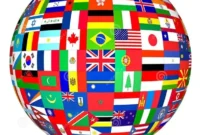The State and Globalization in the Contemporary World
The State and Globalization in the Contemporary World
Theories of globalization and the modern State’s efforts to survive its border-demolishing onslaught
Introduction
W hat is more important for the society—the present or the future ? What it has achieved and preserve or what it can create in the long run? This ordering of preferences is the most crucial point of understanding for any unit—political, social, economic, cultural or otherwise. This binary distinction of the present and the future as a part of other sets of distinctions e.g. the ‘base’ and the ‘superstructure’, or the ‘symbolic’ and the ‘material’ can be traced back to the ancient philosophical distinctions of the
‘mind’ and the ‘body’, the ‘ideal’ and the ‘real’ (Wallerstein, 1990). Nations and people sacrifice welfare and security, which generally demonstrate long-term commitments, to immediate issues as nationalism, ethnicity or religion (Waltz, 1999: 32).

This dissertation is an attempt to revisit this old debate of the ‘ideal’ and the ‘real’ in the present context of states as embedded in International Relations theory and how they react to the processes of globalization. Such an attempt, being extremely broad and diverse in its scope brings many different converging aspects which are in need of clarification at the very outset. This dissertation hopes to identify the manner in which the state perpetuates itself while faced with the reductionist forces of globalization. However, to do so the author will deliberately avoid going in to the extremely rich and contested theories associated with the modern state, their origins and survival as that would be beyond the scope of the present study. Also, for the entire duration of the literature states have been identified as nation-states. This dissertation thus discusses states as identified by international relations, territorially bounded sovereign locations which generally correspond to a single nationalist sentiment, even though being constituted by different nations.
The sovereign scope of the state has been questioned as the world has become more integrated in terms of communications, economic transactions, money flows etc. What is of utmost importance here is to locate the different ways in which states react to such a threat which tends to break its sovereign hold over its subjects. However, before such an analysis can be made globalization as a concept needs to be explained. The first chapter thus describes the major themes of globalization and discusses what the phenomenon supposedly entails. It also briefly touches on the debate of the existence of such a phenomenon. Interdependence and interconnectedness have reduced the state’s sovereign hold over its territorial identity. This is the most crucial claim of the globalization discourse and it has been taken up following an overview of state- sovereignty in the second chapter. Both sides of the argument have been explained in order to provide the reader with a complete understanding of the claims and counter- claims of the globalists, the sceptics and the transformationalists. Chapter three identifies culture as being the major defence of the state against the forces of globalization. This chapter further chooses the Indian state as an example and locates the four different ways in which the Indian state answers the threats of globalization. It shows how India has carved a niche for itself in the international society in the four different fields of economy, politics, military and culture. It also applies the Indian context to show that all states which are rooted in a strong society and culture can accept globalization without the fear of succumbing to it. However, this acceptance necessarily presupposes adaptations on the part of the state. In conclusion, the future of the modern nation-state has been laid out briefly on the basis of such adaptations which it needs to make or have already made. Indeed, there is no denying the recent changes in contemporary world and as the title of this literature suggests, distinctions between ‘us’ and ‘the rest’ are crucial to such an understanding.



